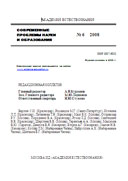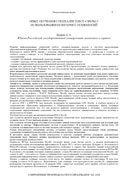PDF-версия статьи


|
Boundary XX-XXI centuries marked a significant increasing role of the ethnic principle in all areas of public life. This process was called by scientists "ethnic revival".
Number of sovereign states on the political map of the world is constantly increasing, and now there are over two hundred states. The growth of this number occurs largely under the influence of ethno-political factors.
On the other hand, there still exists a mismatch of state and ethnocultural boundaries.
Desire of members of ethnic groups to control resources, as well as questions of its own ethno-cultural development and inter-ethnic cooperation, including at the political level, generates aspiration of ethnic groupsto improve their political and legal status, to establish their own state in the framework of a larger state or out of it.
Local elites also stimulate the aspiration of control over resources, emphasizing inherent in any state the regional imbalances of development.
There are three approachesin the understanding of the nature of the nation, of the national identity and the role of ethnic beginning.
The first approach to understanding the nature of the nation was named primordialist (from Lat. Primordial - primary, original).
Proponents see the highest level of ethnic development of the nation in the chain of evolution: the tribe - ethnic group - a nation and about the nationality of (ethnicity) person is referred as innatei.e. initially given.
Representatives of the other approach - the constructivists.
They see ethnicity as situational, changeable and often "imposed" phenomenon.Therefore the representatives of the constructivist approach believe that the individual has the right to choose or change their nationality.
The instrumentalist approach combines the start of the first two approaches, although close towards constructivism.
Its adherents also as constructivists consider the nation with artificial formations that are actively used by some political leaders to win over the separate groups of people and consolidate them around in order to further pursuit of certain political interests.
Thus, all three of the above approach to understanding the nature of the nation are not devoid of serious shortcomings, as well as they all have their rational foundations.
1. XVI сессия Ассамблеи народа Казахстана. «Доверие. Традиции. Транспарентность. Толерантность". 20 октября 2010 года, Астана
ОПУБЛИКОВАНО
Klara Baitureyeva , Gulzipa Esirkepova , Saule Rysbayeva International relations from the viewpoint of Conflictology. // Современные проблемы науки и образования - 2014.-№6. (приложение "Политические науки"). - C. 5